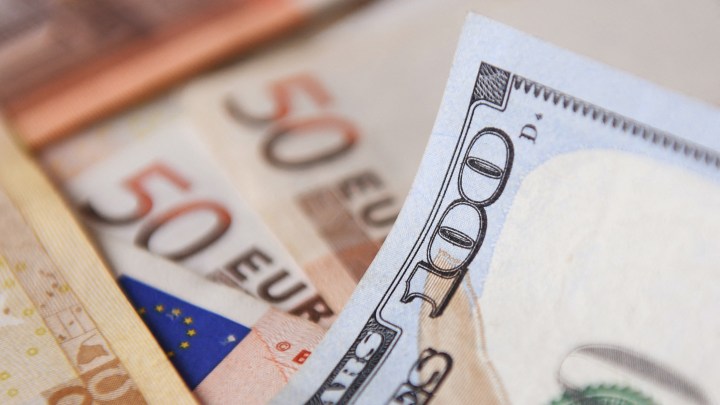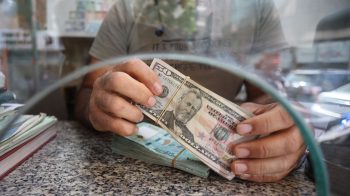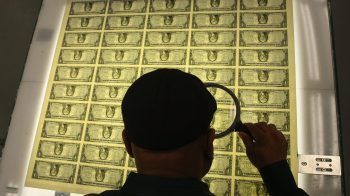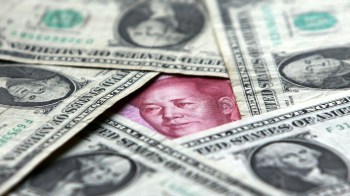
For importers, taking advantage of the strong dollar hasn’t been easy
For importers, taking advantage of the strong dollar hasn’t been easy

The rising value of the dollar can be a problem for U.S. exporters since it makes their products more expensive. It can also be a drag on big, multinational companies that are getting paid in comparatively weaker currencies overseas.
On the other hand, a stronger dollar can be a good thing for U.S. companies that import products, since it effectively makes those products cheaper. But for many small businesses, taking advantage of the strong dollar hasn’t been so easy.
A lot of businesses have been hoping that the stronger dollar would help them save some money on imports.
“We’ve been in active talks about that with about five of our different manufacturers, just even in the last two months,” said Jeff Cayley, founder and CEO of KETL Mtn. and Trail One Components, two mountain bike brands that sell clothing and bike parts.
Cayley said he’s been in touch with his manufacturers in China and Taiwan to negotiate prices.
“If they’re trying to charge us the same amount for the same thing from a year ago, two years ago, then we’ll push back and say, ‘Hey, the U.S. dollar is much stronger now, we would like it at this price,’” Cayley said.
But so far, he said the answer’s been “No.”
“A common excuse will be, ‘Well, we’re charging you the same we charged you two years ago. Yes, the USD is stronger. However, we already factored that in, of course, because our raw materials have gone up. So that’s where it was factored in,’” Cayley said.
Cayley said manufacturers also cite rising labor costs. Others, especially in Europe, have been blaming higher energy prices, said Cathrine Reynolds, who handles imports for Palmetto Tile Distributors in South Carolina.
“We import from Italy and Spain, from Israel,” Reynolds said. “And we continue to have price increases, because they are in the middle of an energy crisis, because of everything going on with Russia and Ukraine.”
Reynolds said her manufacturers have started to add energy surcharges on top of her orders. Even though her dollars go farther versus the euro and the shekel, Reynolds said she’s not saving any money. “It’s kind of a wash, unfortunately.”
Importers sometimes can’t take advantage of the strong dollar because their foreign vendors prefer to be paid in dollars instead of their own local currencies.
“You will never buy anything in Lebanese currency,” said Pat Whelan, who handles imports at Sahadi’s, a grocery store and wholesaler in Brooklyn that imports a lot of products from Lebanon, along with other countries in the Middle East and North Africa. “In certain countries, where they have a government that’s not quite as stable or a currency that’s not quite as stable, they almost insist on having it in dollars.”
Plus, foreign vendors often need those dollars to turn around and pay other businesses that demand greenbacks.
“I have one vendor that leaves it in a U.S. dollar account, because when he’s going to buy, say, glass jars or caps or labels or something like that, they also buy in U.S. dollars,” Whelan said.
That said, some importers have had a little more luck.
Greg Warwick, CEO of TMB Baking, imports a lot of equipment from Europe, and many of his vendors take payments in euros. As the value of the euro has fallen this year, Warwick said the challenge has been knowing when to pounce.
“I have been looking at it a lot and sometimes kind of kicking myself, thinking that we didn’t buy when it was low,” Warwick said.
Late last month, when the euro’s value dropped to 97 cents, Warwick took action. He stocked up on euros through his foreign exchange broker.
“We, cumulatively, within the course of the week, bought 100,000 euros,” Warwick said.
Warwick said he knows the dollar’s rising value versus other currencies isn’t a great sign for the global economy. But it’ll also take the edge off the rising costs he’s been facing for shipping, trucking and fuel.
“We are taking advantage of something, of course,” Warwick said. “It would be foolish for us not to do so if we had the opportunity.”
Warwick said the euros he bought should be enough for about a month’s worth of equipment purchases.
There’s a lot happening in the world. Through it all, Marketplace is here for you.
You rely on Marketplace to break down the world’s events and tell you how it affects you in a fact-based, approachable way. We rely on your financial support to keep making that possible.
Your donation today powers the independent journalism that you rely on. For just $5/month, you can help sustain Marketplace so we can keep reporting on the things that matter to you.

















